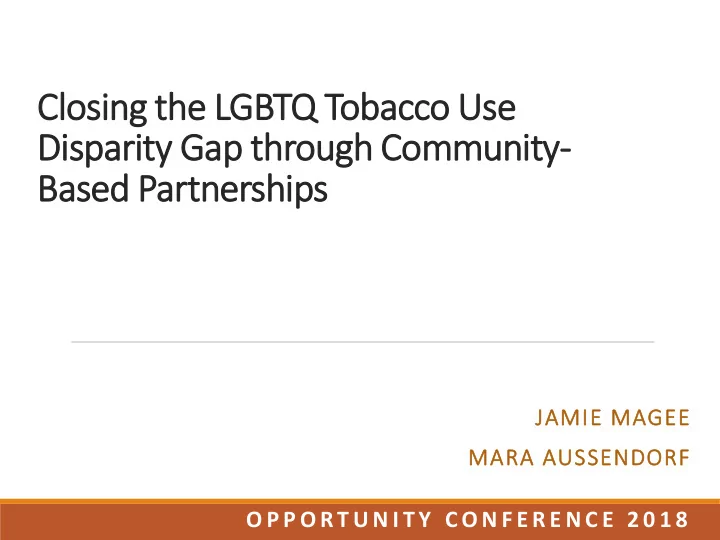

Closing t the L LGBTQ Tob obacc cco U Use e Di Dispari arity G y Gap through C Community- Based P Partnersh ships JAMI MIE MAG AGEE MARA A AUSSE SEND NDORF O P P O R T U N I T Y C O N F E R E N C E 2 0 1 8
We have no conflicts of interest to disclose. This program is supported by the Pennsylvania Department of Health. Its contents are solely the responsibility of the authors and do not necessarily represent the official views of the Pennsylvania Department of Health.
WHO WE ARE
Sout utheastern P Pennsylvania Tob obacco C o Con ontrol P Proj oject (SEPA TC TCP) • 7 Counties • 21 service providers: • Healthcare systems • Community- based organizations
The number one preventable cause of death for LGBTQ people is… TOBACCO USE.
Who smokes at higher rates? SOURCES LGB General Population CDC 20.6% 15.1% American Lung 30.4% 20.6% Association Truth Initiative 23.9% 16.6% Philly Area LGBTQA 26.9% 19.9% Community Health Needs Assessment Gallup 28% 18% SAMHSA 32% 20%
Young People 40% of LGB high school 19% of LGB high school students smoke cigarettes. students use at least one type of tobacco product. That’s 33% higher than among heterosexual 3 in 10 LGB youth use students . e-cigarettes , which is 25% higher than heterosexual youth . LGB youth are twice as likely to be daily smokers .
Transgender People 31% of transgender youth smoke cigarettes. Transgender adults report using any product (cigarettes, cigars, or e- cigarettes) in the past 30 days at higher rates than cisgender adults (39.7% vs 25.1%). In Pennsylvania, transgender community members experience the highest tobacco consumption rates among the LGBTQ sub-communities, greater than 50% in some regions.
The Effects More than 30,000 LGBT people die from tobacco-related diseases every year. Life expectancy drops 13 to 14 years. Cigarettes kill more people in the U.S. than alcohol, car accidents, suicide, AIDS, homicide, and illegal drugs combined.
Tobacco as it Relates to Other LGBTQ Health Risks HIV treatment Mental health Drug use Health services access
“LGBT people who are comfortable asking their doctor for help are 80% more likely to prepare to quit smoking , so healthcare providers can help end these disparities by reaching out to LGBT youth in a culturally-competent and inclusive way.” -LGBT HealthLink 45% of Philadelphia area LGBTQ people fear a negative reaction by healthcare providers if they were to come out as LBGTQ to them.
LGBTQ Issues (in PA) When asked to rank the top health challenges affecting the LGBT community, survey participants routinely listed HIV, suicide, depression/anxiety, and bullying at the top and tobacco and cancer near or at the bottom despite the overwhelming tobacco usage in Pennsylvania.
Tobacco & LGBTQ Clients in SEPA’s Tobacco Control Project 8,201 clients 257 LGBTQ clients 46% of straight/cisgender clients quit 19% of LGBTQ clients quit
SEPA TCP Mental Health Data Mental health issues (anxiety, depression, bipolar disorder, alcohol/drug use, or schizophrenia) 66% of LGBTQ participants 44% of straight/cis participants Emotional challenge 65% of LGBTQ participants 42% of straight/cis participants Emotional challenges that caused problems with their work, family life, and/or social activities in the past two weeks 40% of LGBTQ participants 26% of straight/cis participants
Targeted ed outrea each t to LG LGBTQ BTQ communities i in Southeastern P PA Subcontracts:
Tar argeted o outreac ach t to LGBTQ communit ities ies in n South theas aster ern P PA Direct messaging for prevention and cessation to the o LGBTQ community Educational materials • Outreach in public schools • Tables at LGBTQ events • Outreach in gay bars • Policy change: Smoke-Free Pride, Smoke-Free Bars o Cultural Competence Training for TDT providers o
Smoke ke-Fre ree Prides Smoke-free sponsorship of regional pride celebrations has led to ALL SEPA Prides going 100% smoke-free!
Dr Drag O Outr treach Contracted drag performer works to promote LGBT- smoke free spaces in LGBT bars
GSA T A Tobac bacco-Free A ee Art Show
Co Co-branded H Health P Promo motion C Campaign gn
Cultural Competency Training Unique barriers to accessing healthcare Difference in quality of care Creating welcoming spaces Training for all staff Offered continuing training for staff coalition members’ healthcare sites Offered TA around organizational policies Offered CE’s
Increased physical Increased risk Increased mental health challenges behaviors health challenges LGBT People Don’t Have Health Equity Geographic Increased barriers barriers to some Increased Barriers to preventative LGBT health to insurance care needs coverage or insurance access
Barriers to Care The data demonstrated that one in four LGBT people in the Lehigh Valley had a negative past experience from a healthcare professional because of their LGBT status Many say they have a fear of going to any healthcare professional as a result Only 30% of LGBT people in the Lehigh Valley say that their doctor is very LGBT-welcoming and only 31% say that their doctor is very or extremely knowledgeable about LGBT health Only 54% are out to ALL their healthcare providers.
Cultural Competency Training Evaluation • Post-meeting surveys • 95% of service providers said the training was useful. • The number of clients nearly doubled in the 6 months following the training.
On a positive note… LGBT Pennsylvanians have a stated interest in improving their health! Strong interest in active living strategies ● Strong interest in healthy eating strategies ● Strong interest in quitting tobacco ● A majority of LGBT people in every region were not appreciative of ● tobacco industry sponsorship / marketing to the LGBT community A majority of LGBT people in every region support smoke-free pride ● celebrations
Jamie Magee JAMAGEE@PHMC.ORG Mara Aussendorf MAUSSENDORF@PHMC.ORG
Recommend
More recommend